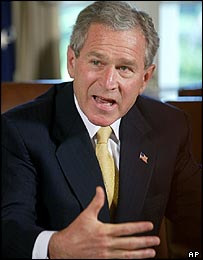
Bush defended White House claims of links between Iraq and al-Qaeda
|
President George W Bush has disputed findings by a commission investigating the 9/11 attacks that there was no link between al-Qaeda and Saddam Hussein.
Mr Bush said his administration never claimed Iraq helped co-ordinate the 11 September 2001 attacks on the US, only that it had had contacts with al-Qaeda.
The commission held its last day of public hearings on Thursday before its final report is published next month.
It heard of the full extent of chaos on 9/11, much to relatives' distress.
This week the commission released statements on its preliminary findings on al-Qaeda, the 9/11 plot and US defences.
On al-Qaeda, the group said it had found no "credible evidence" that Iraq helped the militants carry out the 9/11 attacks.
The commission did acknowledge that a meeting had taken place between al-Qaeda leader Osama Bin Laden and Iraqi intelligence officers during the 1990s in Sudan, but said there was no evidence it led to a working relationship.
The comments contradicted remarks by Vice-President Dick Cheney about Saddam Hussein's "long-established ties" with al-Qaeda and cast doubt on one of the Bush administration's justifications for invading Iraq.
Democrat accusations
But President Bush remained adamant on Thursday that there had been "numerous contacts" between Iraq and al-Qaeda.
 |
 We have no credible evidence that Iraq and al-Qaeda co-operated on attacks against the United States
We have no credible evidence that Iraq and al-Qaeda co-operated on attacks against the United States

Commission report on al-Qaeda
|
"The reason I keep insisting that there was a relationship between Iraq and Saddam and al-Qaeda is because there was a relationship between Iraq and al-Qaeda," he told reporters.
"This administration never said that the 9/11 attacks were orchestrated between Saddam and al-Qaeda. We did say there were numerous contacts between Saddam Hussein and al-Qaeda."
For the Bush administration, this has been one of the most politically damaging conclusions reached by the commission so far, says the BBC's Rob Watson in Washington.
It prompted Democratic presidential challenger John Kerry to accuse Mr Bush of misleading the American people.
In another preliminary report published on Thursday, the commission summarised the response of the military, Federal Aviation Administration and other agencies on 9/11.
It found:
- The US air defence was disastrously unprepared;
- Vice-President Cheney authorised fighter jets to shoot down the aircraft, but the orders did not reach military pilots in time
- Unprepared officials had to improvise a response
- False reports of car bombings and other attacks spread confusion in the hours after the planes crashed
- Response efforts were hampered by difficulties knowing where the planes were after hijackers switched off tracking transponders
On its final day, the inquiry was played tapes of the hijackers' messages apparently aimed at passengers but intercepted by air traffic controllers.
In one, the voice believed to be of ringleader Mohammed Atta is heard telling passengers on American Airlines Flight 11, shortly after taking-off from Boston: "We have some planes. Stay quiet and you'll be OK. We are returning to the airport."
Some of the relatives of victims were so distressed they had to leave the room. Others were in tears, and some shouted protests.
In the 18 months since it started work, the commission has heard from more than 1,000 witnesses and reviewed more than two million documents.

